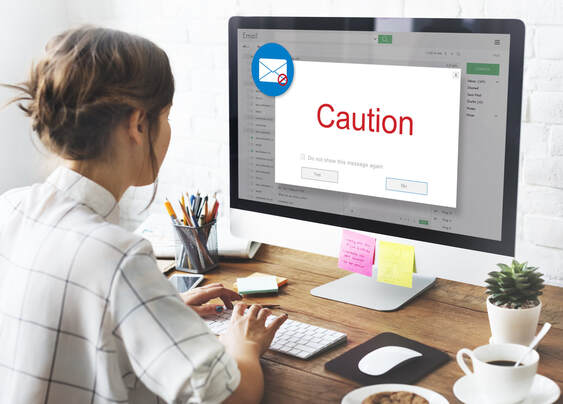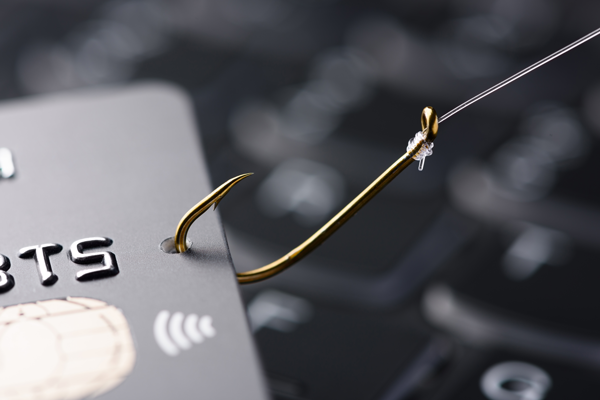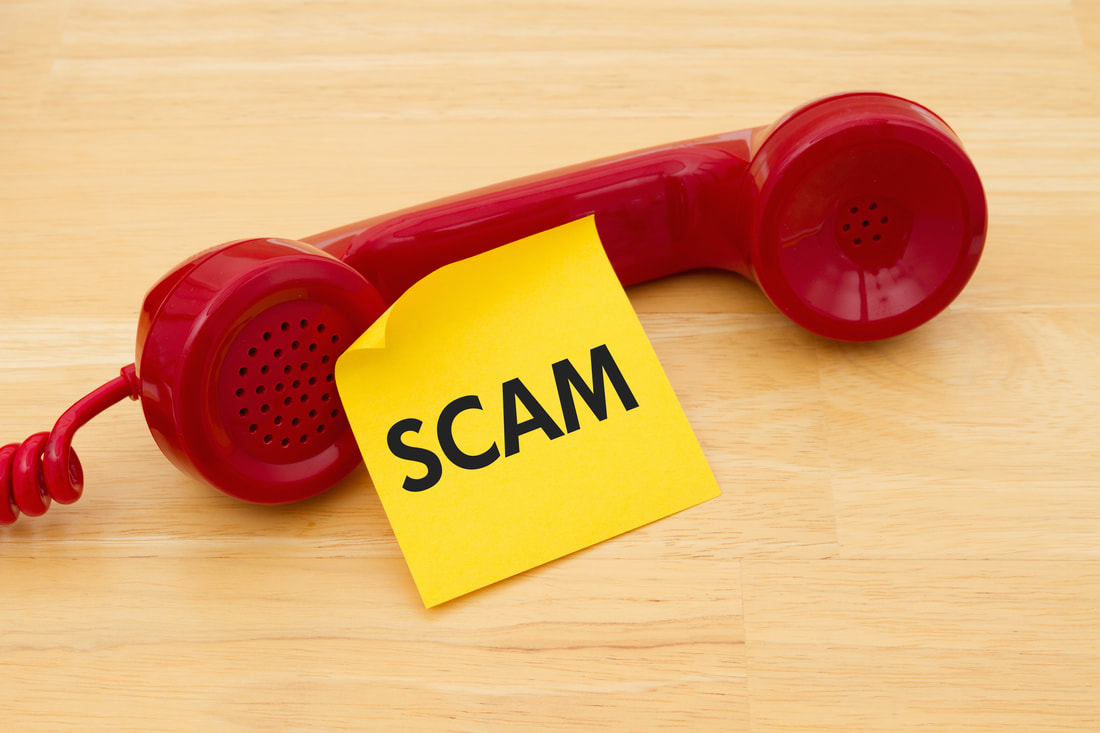Scams Targeting Restaurants
HERE ARE SOME SCAMS TARGETING RESTAURANTS
Resourceful con artists are always coming up with new ways to fleece money from people. Some scams seem perfectly designed to take advantage of restaurant operators—since it is a restaurant owner’s nature to be a hospitable and welcome new business.
Resourceful con artists are always coming up with new ways to fleece money from people. Some scams seem perfectly designed to take advantage of restaurant operators—since it is a restaurant owner’s nature to be a hospitable and welcome new business.
|
Be Alert for Phishing Attempts
Scammers have become very sophisticated so it's important to be on the lookout for email that might look legitimate but are really scam attempts targeting your company. Phishing attempts can even appear as if they are coming from WRA staff and leaders. Make sure you and your staff know how to spot phishing attempts via email or text to ensure your company does not become a victim. Make sure to educate all staff who use email or text for company purposes on how to recognize phishing scams, and to develop best-practices for dealing with any suspicious emails and text messages. Click the More Info button below for some tips on how to educate staff to identify scam attempts. |
|
Phony Health Inspector Scam
A restaurant operator recently reported receiving a call from someone posing as a health inspector who was to inspect the restaurant later that afternoon. The caller asked the restaurant operator for checking account information or a credit card number. Luckily they were suspicious and did not supply information to the fake inspector. Keep in mind that anyone claiming to represent a restaurant inspector can be verified by calling the local health department. An inspector would not request financial information for payment by phone for any license fees. Restaurant operators may be especially vulnerable as restaurant licenses are up for renewal. If you receive a call like this, do not supply any account information and promptly get off the call. Advise your staff not to share any financial account information with anybody over the phone unless they are authorized to do so and then only with trusted business partners. |

Utilities Scam Still a Threat to Wisconsin Restaurants
The Wisconsin Restaurant Association was first informed about a scam impacting both restaurants and the general public in 2013. Instead of playing itself out, it is still a concern. The scammers are savvy and often place their fraudulent calls during the busiest times for restaurants. Please familiarize yourself with the scam and educate your employees.
Fraudulent calls are made by imposters claiming to work for the local electric company or water utility. These “customer service representatives” then attempt to collect payment for alleged “past due statements.” Typically they instruct targeted victims to either wire money, load money onto a prepaid debit card or provide credit card information over the phone immediately to avoid having their power or water shut off.
If you explain you have been paying your bills on time, they often will respond that your meter is malfunctioning and you must pay for a new one. If you are actually behind on payments, avoid falling prey to these scammers and check the status of your account with your utility company.
Also, be aware that these scammers can “spoof” a caller ID system, making it read whatever they would like. The Department of Agriculture, Trade & Consumer Protection (DATCP) has heard from consumers who have had their utility company’s name pop up on their caller ID when they were contacted in this scam.
DATCP has the following suggestions if you are contacted by someone saying you owe money to your utility company:
Remember:
For additional information or to file a complaint, visit the Consumer Protection Bureau, send an e-mail to [email protected] or call the Consumer Information Hotline toll-free at 1-800-422-7128.
Additional articles on the scam:
Better Business Bureau
We Energies
Journal Sentinel
The Wisconsin Restaurant Association was first informed about a scam impacting both restaurants and the general public in 2013. Instead of playing itself out, it is still a concern. The scammers are savvy and often place their fraudulent calls during the busiest times for restaurants. Please familiarize yourself with the scam and educate your employees.
Fraudulent calls are made by imposters claiming to work for the local electric company or water utility. These “customer service representatives” then attempt to collect payment for alleged “past due statements.” Typically they instruct targeted victims to either wire money, load money onto a prepaid debit card or provide credit card information over the phone immediately to avoid having their power or water shut off.
If you explain you have been paying your bills on time, they often will respond that your meter is malfunctioning and you must pay for a new one. If you are actually behind on payments, avoid falling prey to these scammers and check the status of your account with your utility company.
Also, be aware that these scammers can “spoof” a caller ID system, making it read whatever they would like. The Department of Agriculture, Trade & Consumer Protection (DATCP) has heard from consumers who have had their utility company’s name pop up on their caller ID when they were contacted in this scam.
DATCP has the following suggestions if you are contacted by someone saying you owe money to your utility company:
- Hang up the phone.
- Call your utility company using the number listed on your monthly statement to verify your account balance.
- Report any fraudulent bill collection calls to your utility company.
- File a report with your local police.
- Call DATCP’s Consumer Information Hotline at 1-800-422-7128.
Remember:
- Reputable businesses do not require payments through prepaid cards or wire transfers. They will give you multiple options to pay.
- NEVER give your debit or prepaid reloadable card PIN number to ANYONE, individual or business.
- The PIN number must always remain secret, no matter what anyone tells you.
- NEVER send a wire transfer to someone you haven’t met in person.
For additional information or to file a complaint, visit the Consumer Protection Bureau, send an e-mail to [email protected] or call the Consumer Information Hotline toll-free at 1-800-422-7128.
Additional articles on the scam:
Better Business Bureau
We Energies
Journal Sentinel
|
Reservation Scam Email
Since WRA staff members have been receiving these solicitations (probably because our email addresses have the word restaurant in them), we assume restaurants around the state are also getting this type of email. Here is an example of a reservation scam email that WRA staff has received: Hello,
I want to make a booking reservation for some 8 adults at your restaurant once daily for 5 days They will be coming to your restaurant for dinner on the 17th, to 21st of October 2017 on a 5 days. They are 8 adults kindly advise if the dates are available so that i will send you my credit card details for a prepayment booking. Best Regards, Prof. Helene Margaret B. |
While it’s possible that group of distinguished travelers from overseas may be planning a trip to Wisconsin and making reservations at local restaurants, please use caution if you receive an email from an individual in a foreign country who is asking about reservations and pre-payment for holding the reservations.
The premise of “advance fee fraud” is that an individual will approach you via email asking to make a reservation for a group of people from a foreign country. He or she will provide a fraudulent overpayment to hold the reservation, cancel the reservation and request a refund of the difference with your (real) money! The scam works because of the delay between the money appearing as available in your bank and the payment actually being honored, which can take time with wire transfers. Because the prepayment was with stolen credit cards or a forged check, the account from which it was drawn will ultimately refuse payment. The initial email may appear legitimate, but often as things progress the focus on prepayment becomes apparent. Other telltale clues are: poor grammar, irregular use of capitalization, use of title of profession to indicate their status (government official, doctor, scholar, etc.) to impress you and when referencing your business is it rarely referred to by name, just "your restaurant" or "your hotel." Alert any staff who may handle email inquiries for your restaurant about this scam! |
If you spot a scam, let WRA know so we can inform our members. |
FAQs
I heard that one of my competitors was recently cheated out of $500 with a utilities scam.
What do I need to know to avoid getting swindled?
What do I need to know to avoid getting swindled?
The Wisconsin Restaurant Association was first informed about a scam impacting both restaurants and the general public in 2013. Instead of playing itself out, it is still being perpetrated. The scammers are savvy and often place their fraudulent calls during the busiest times for restaurants.
Please familiarize yourself with the scam and educate your employees so that you won’t be the next victim.
Fraudulent calls are made by imposters claiming to work for the local electric company or water utility. These "customer service representatives" then attempt to collect payment for alleged "past due statements." Typically they instruct targeted victims to either wire money, load money onto a prepaid debit card or provide credit card information over the phone immediately to avoid having their power or water shut off.
If you explain you have been paying your bills on time, they often will respond that your meter is malfunctioning and you must pay for a new one. If you are actually behind on payments, avoid falling prey to these scammers and check the status of your account with your utility company.
Also, be aware that these scammers can "spoof" a caller ID system, making it read whatever they would like. The Department of Agriculture, Trade & Consumer Protection (DATCP) has heard from consumers who have had their utility company's name pop up on their caller ID when they were contacted in this scam.
DATCP has the following suggestions if you are contacted by someone saying you owe money to your utility company:
Remember:
For additional information or to file a complaint, visit the Consumer Protection Bureau website at http://datcp.wisconsin.gov, send an e-mail to [email protected] or call the Consumer Information Hotline toll-free at 800-422-7128.
Please familiarize yourself with the scam and educate your employees so that you won’t be the next victim.
Fraudulent calls are made by imposters claiming to work for the local electric company or water utility. These "customer service representatives" then attempt to collect payment for alleged "past due statements." Typically they instruct targeted victims to either wire money, load money onto a prepaid debit card or provide credit card information over the phone immediately to avoid having their power or water shut off.
If you explain you have been paying your bills on time, they often will respond that your meter is malfunctioning and you must pay for a new one. If you are actually behind on payments, avoid falling prey to these scammers and check the status of your account with your utility company.
Also, be aware that these scammers can "spoof" a caller ID system, making it read whatever they would like. The Department of Agriculture, Trade & Consumer Protection (DATCP) has heard from consumers who have had their utility company's name pop up on their caller ID when they were contacted in this scam.
DATCP has the following suggestions if you are contacted by someone saying you owe money to your utility company:
- Hang up the phone.
- Call your utility company using the number listed on your monthly statement to verify your account balance.
- Report any fraudulent bill collection calls to your utility company.
- File a report with your local police.
- Call DATCP's Consumer Information Hotline at 1-800-422-7128.
Remember:
- Reputable businesses do not require payments through prepaid cards or wire transfers. They will give you multiple options to pay.
- NEVER give your debit or prepaid reloadable card PIN number to ANYONE, individual or business.
- The PIN number must always remain secret, no matter what anyone tells you.
- NEVER send a wire transfer to someone you haven't met in person.
For additional information or to file a complaint, visit the Consumer Protection Bureau website at http://datcp.wisconsin.gov, send an e-mail to [email protected] or call the Consumer Information Hotline toll-free at 800-422-7128.
Our manager said he got a “robocall” from a company claiming to be Google (although the caller ID didn’t display the company name Google) asking us to verify our business information for Google Maps. Was this a scam?
Probably... it's very unlikely that Google contacted you. Some companies are taking advantage of businesses eager to make sure their information is correct in Google+ and Google Maps. Essentially what they are doing is charging you a fee to verify your information—something that can be done for free directly through Google. You can hire a company to do this and other types of search engine optimization (SEO) work for you, but make sure it is a conscious decision and not the result of unscrupulous companies using the brand recognition and reputation of Google's name to scam you.
Typically the scam starts with an automated robo-caller who explains that your GoogleMaps or Google Place for Business listing has either not been "claimed" or is in need of updating or confirmation. You are then asked to press a number on your phone or stay on the line. An individual (often from an overseas call center) will ask you to verify or confirm your Google Maps or Google business listing. You will be given the impression that if you don't immediately respond your listing will be removed from Google. You may also be pressured to purchase a package of services that will allegedly promote your business and increase your exposure online (SEO). Often the fee is $200-$300 for this "service" which is something that you can do quickly and at no cost with the real Google.
Google themselves warn about this scheme (I guess there are lots of Google scams out there involving lotteries, job training, etc.): "Google Maps/SEO fake invoices—Google does not charge for inclusion in Google Maps. Be wary of invoices for services received—especially if nobody in the business remembers purchasing those services. Make sure to perform due diligence on any financial transaction." Google offers tips about "adding or claiming" your business on Google found at www.google.com/business.
Bottom line—if something seems suspicious—get off the phone ASAP. Don't share your information and keep an eye out for phony invoices. Alert your staff too—make sure only designated employees are authorized to speak on your behalf.
Typically the scam starts with an automated robo-caller who explains that your GoogleMaps or Google Place for Business listing has either not been "claimed" or is in need of updating or confirmation. You are then asked to press a number on your phone or stay on the line. An individual (often from an overseas call center) will ask you to verify or confirm your Google Maps or Google business listing. You will be given the impression that if you don't immediately respond your listing will be removed from Google. You may also be pressured to purchase a package of services that will allegedly promote your business and increase your exposure online (SEO). Often the fee is $200-$300 for this "service" which is something that you can do quickly and at no cost with the real Google.
Google themselves warn about this scheme (I guess there are lots of Google scams out there involving lotteries, job training, etc.): "Google Maps/SEO fake invoices—Google does not charge for inclusion in Google Maps. Be wary of invoices for services received—especially if nobody in the business remembers purchasing those services. Make sure to perform due diligence on any financial transaction." Google offers tips about "adding or claiming" your business on Google found at www.google.com/business.
Bottom line—if something seems suspicious—get off the phone ASAP. Don't share your information and keep an eye out for phony invoices. Alert your staff too—make sure only designated employees are authorized to speak on your behalf.





